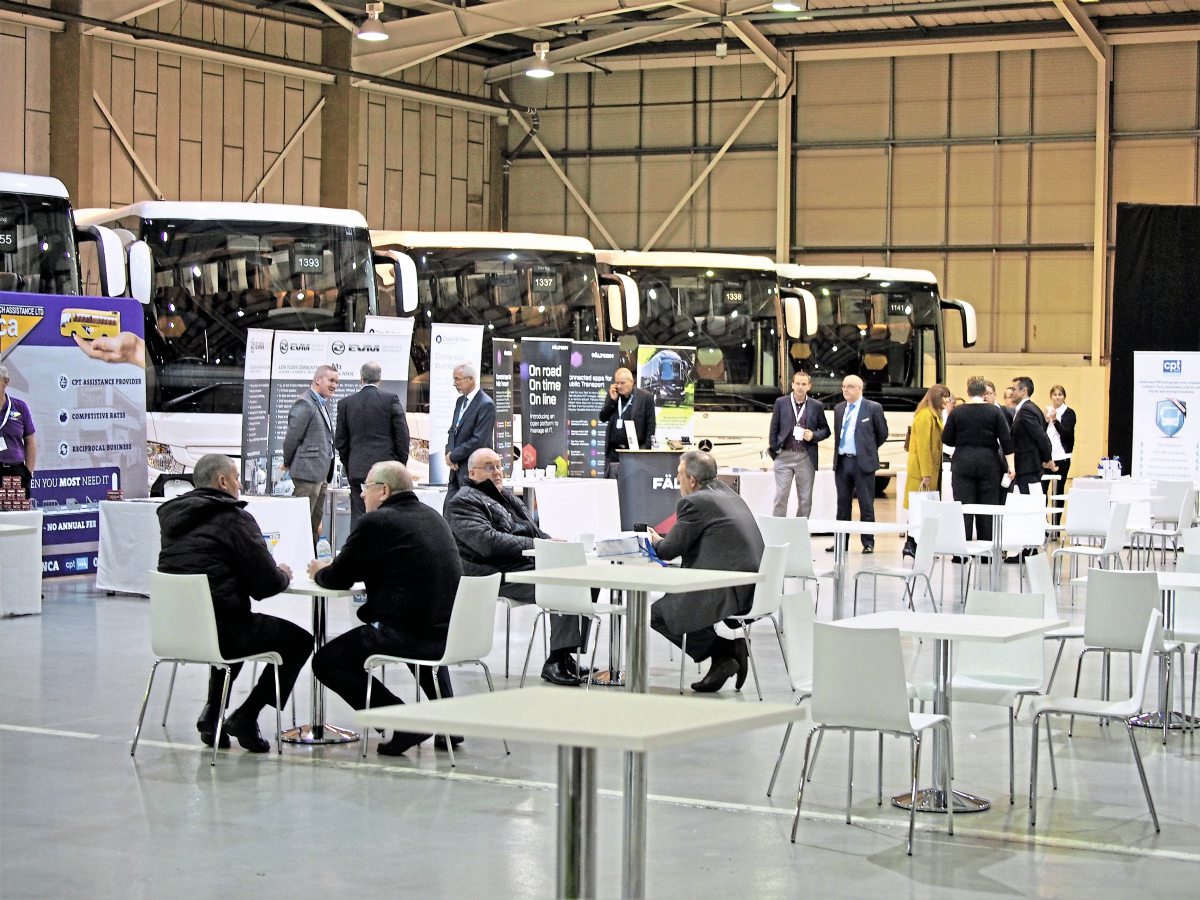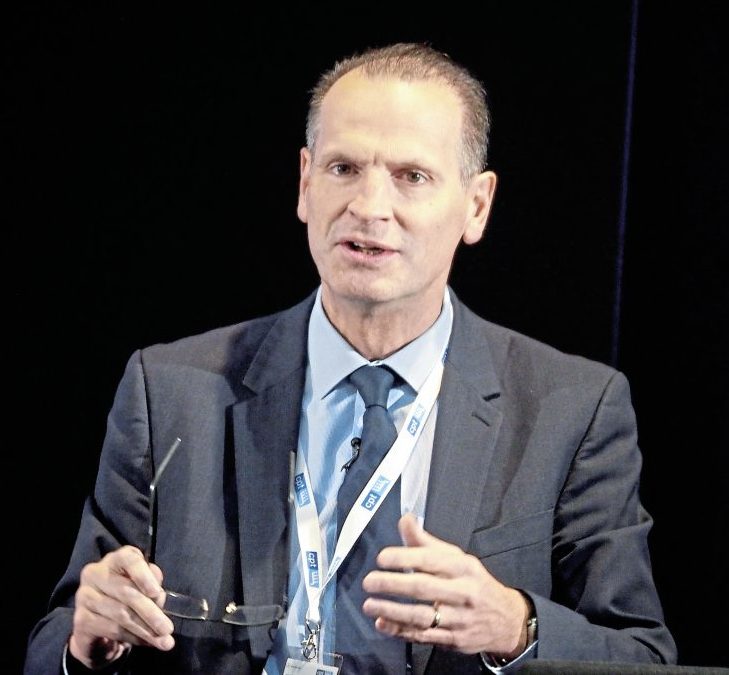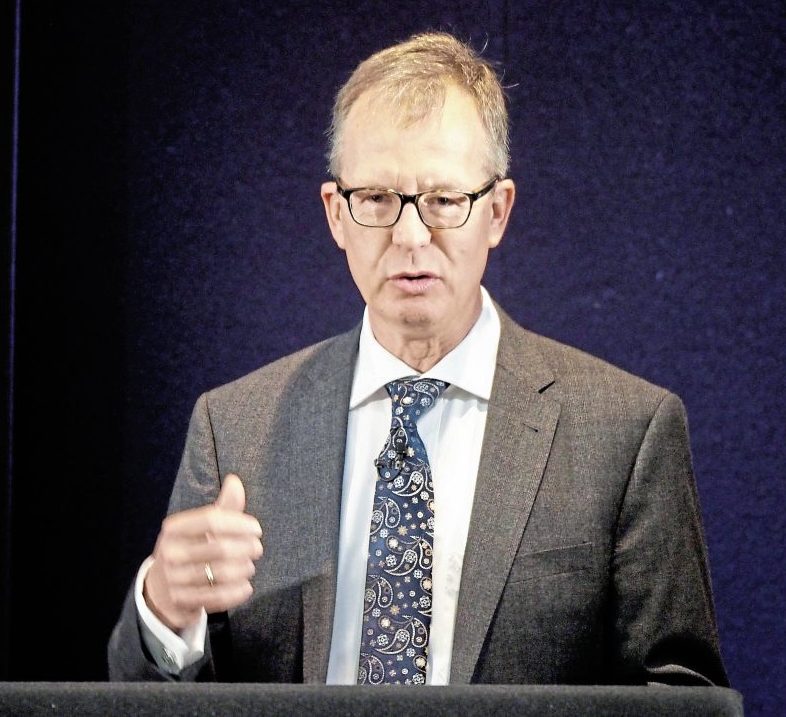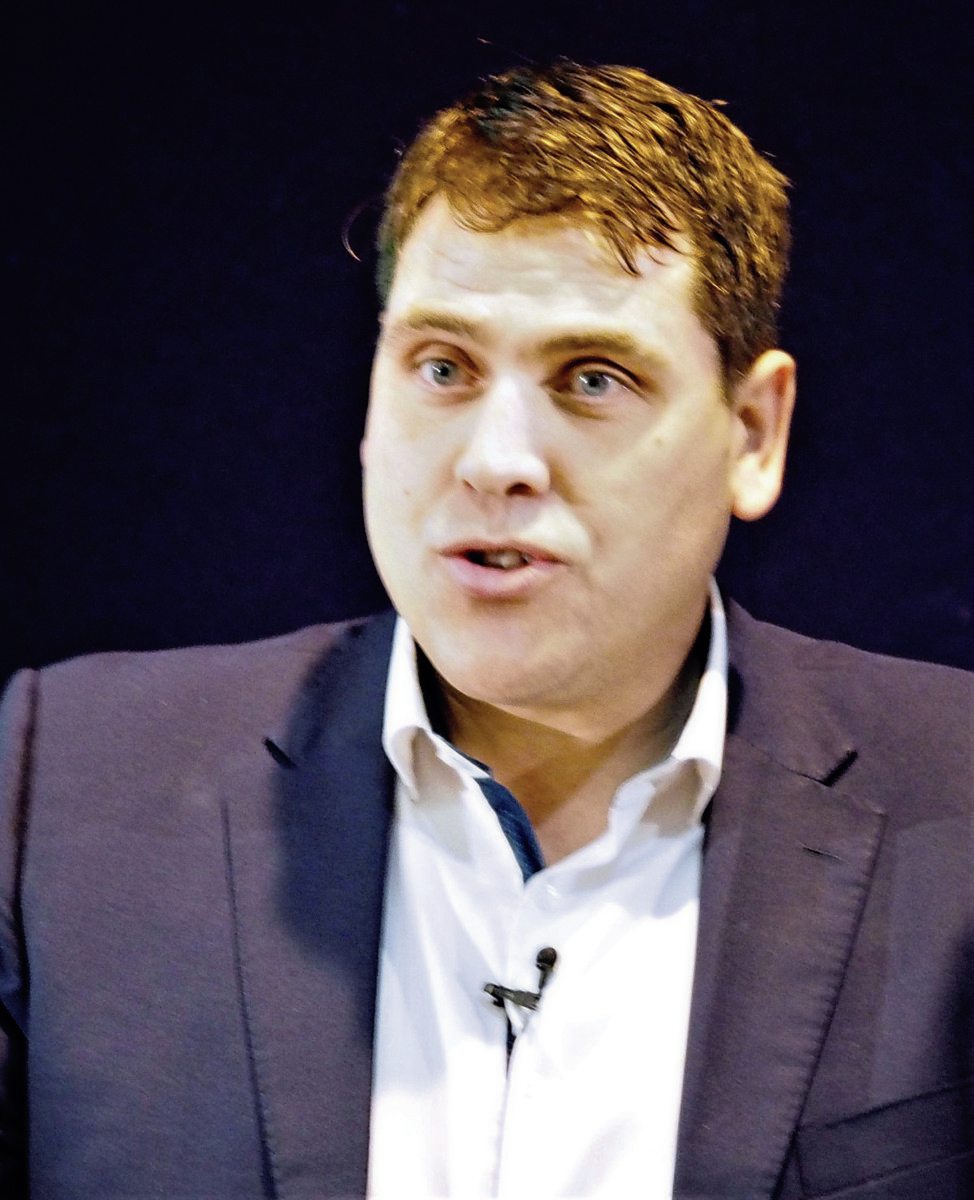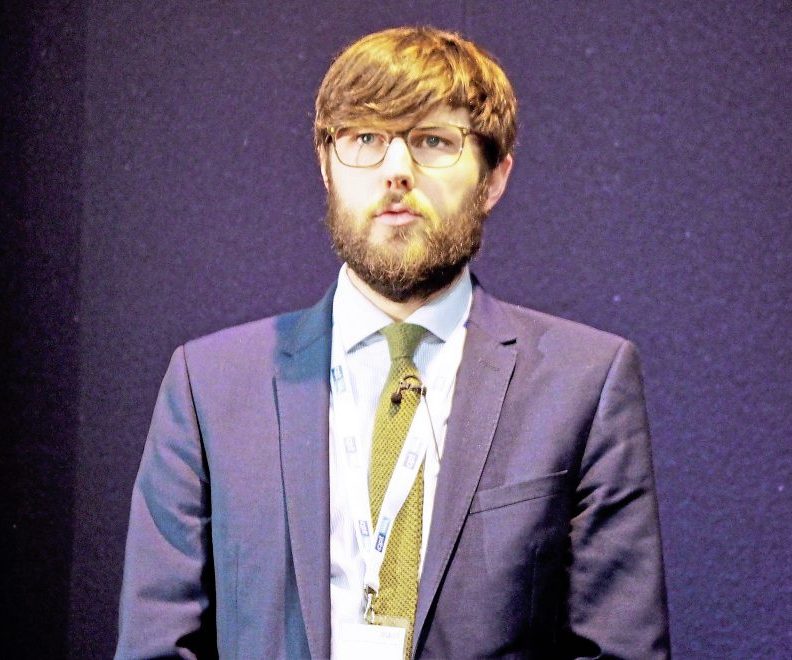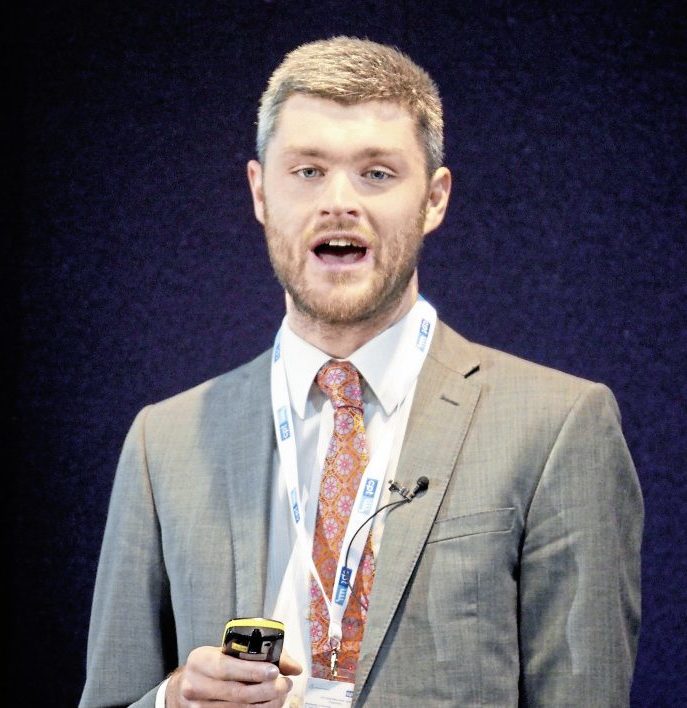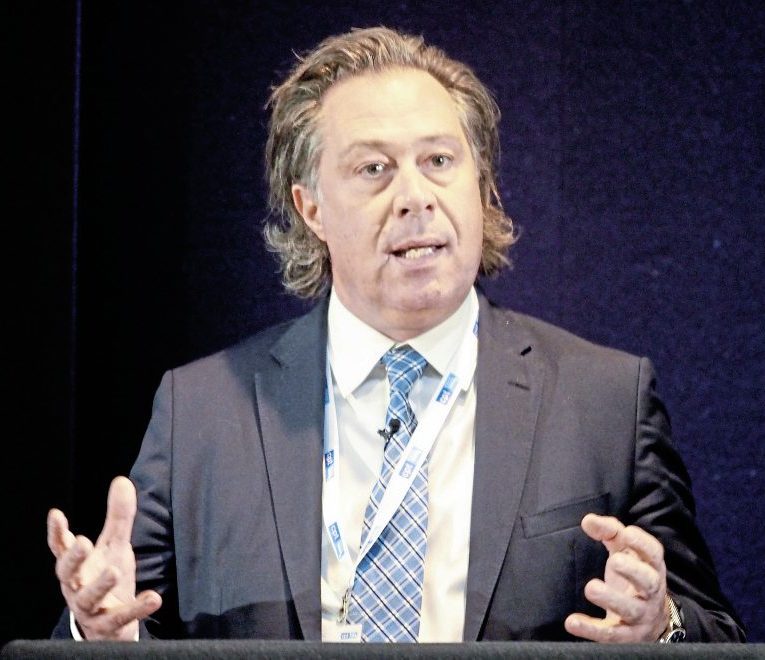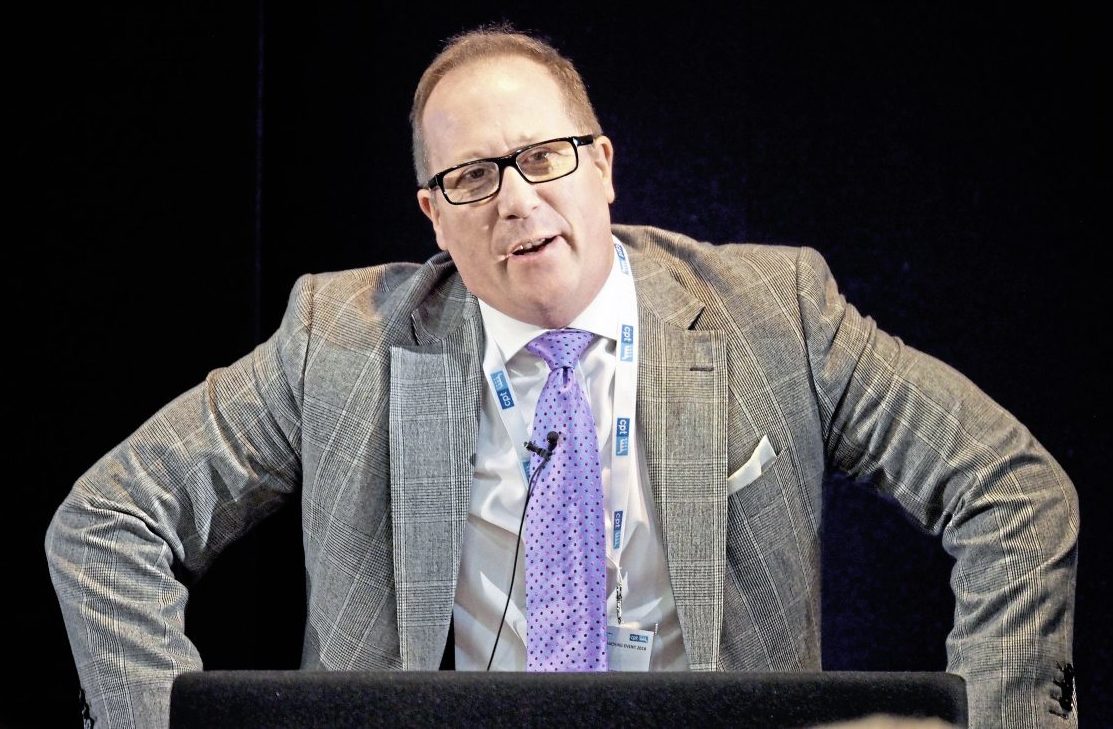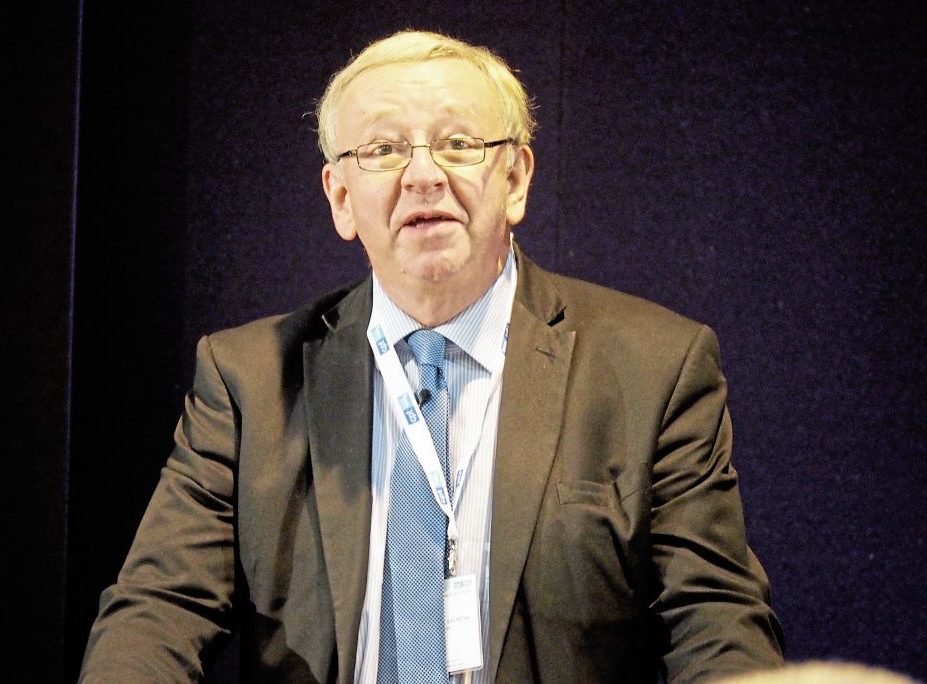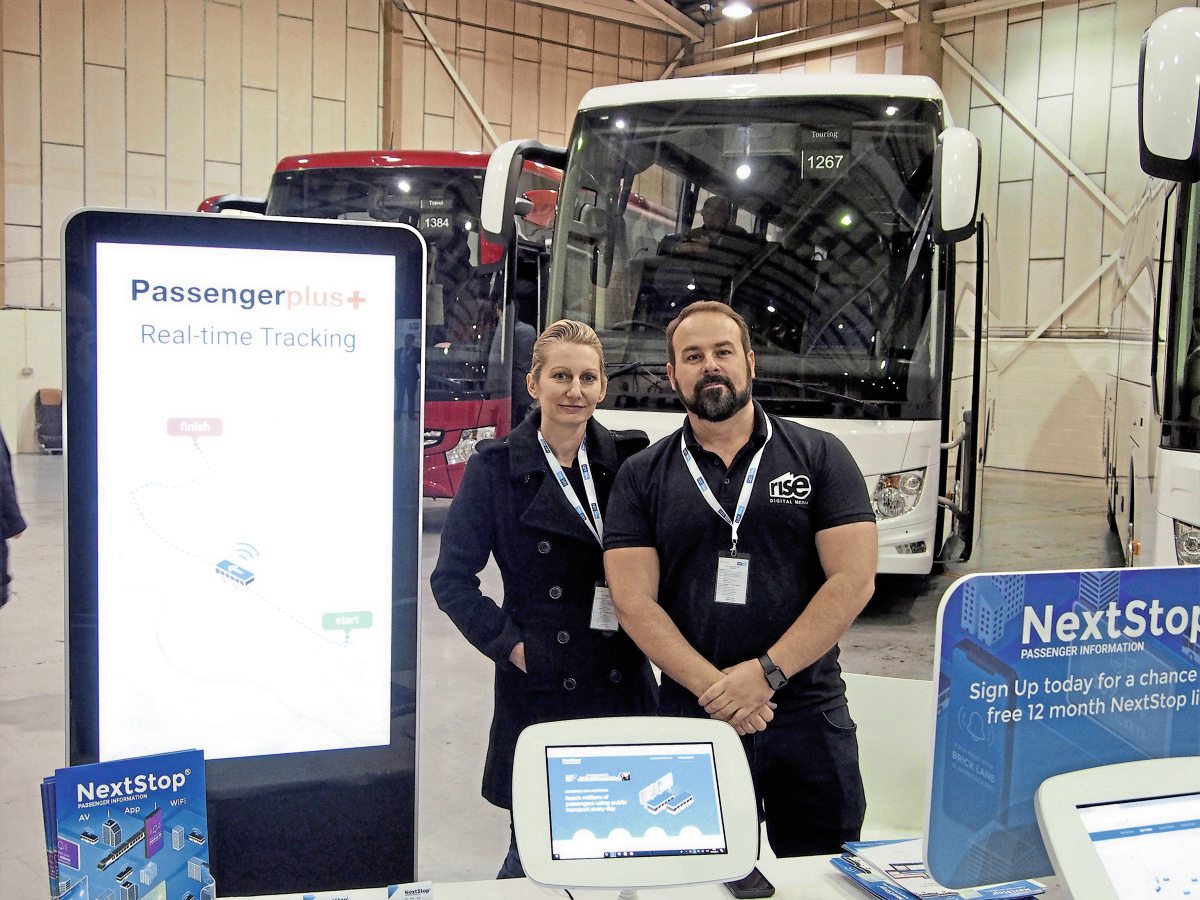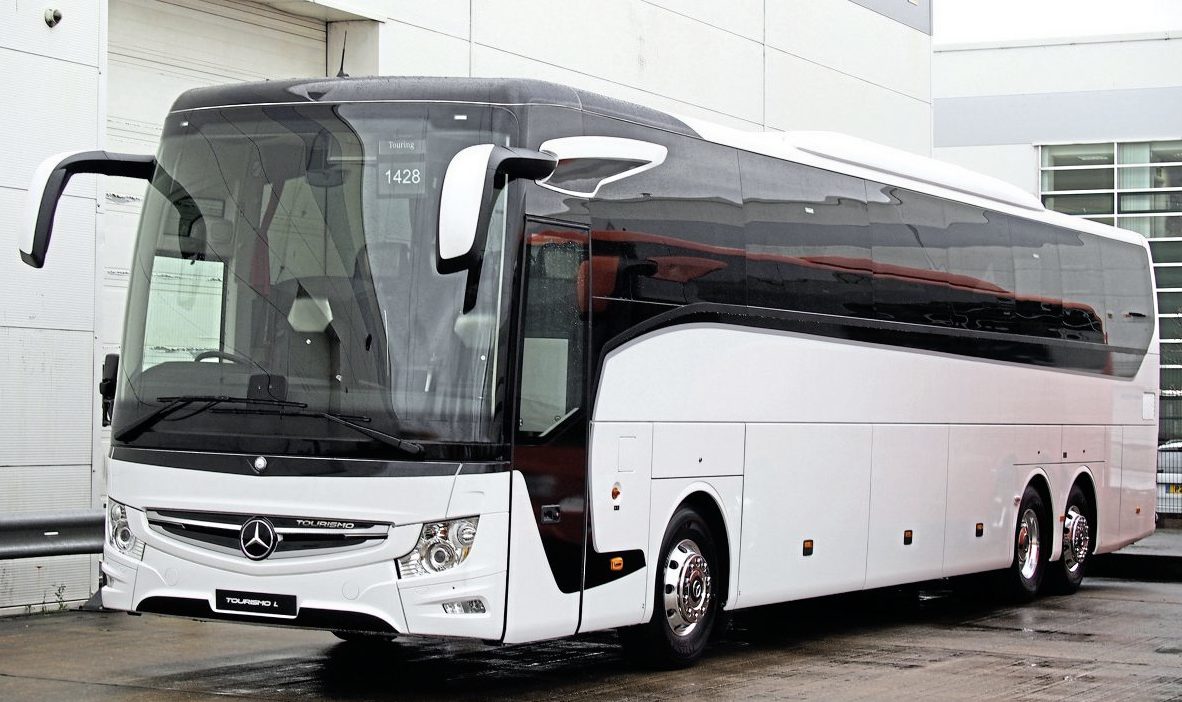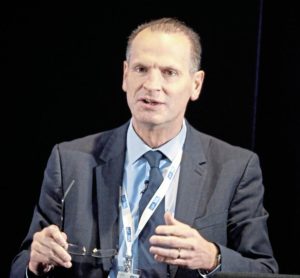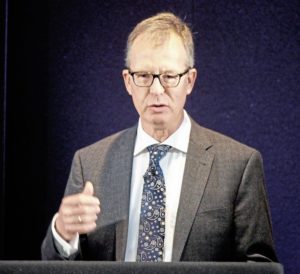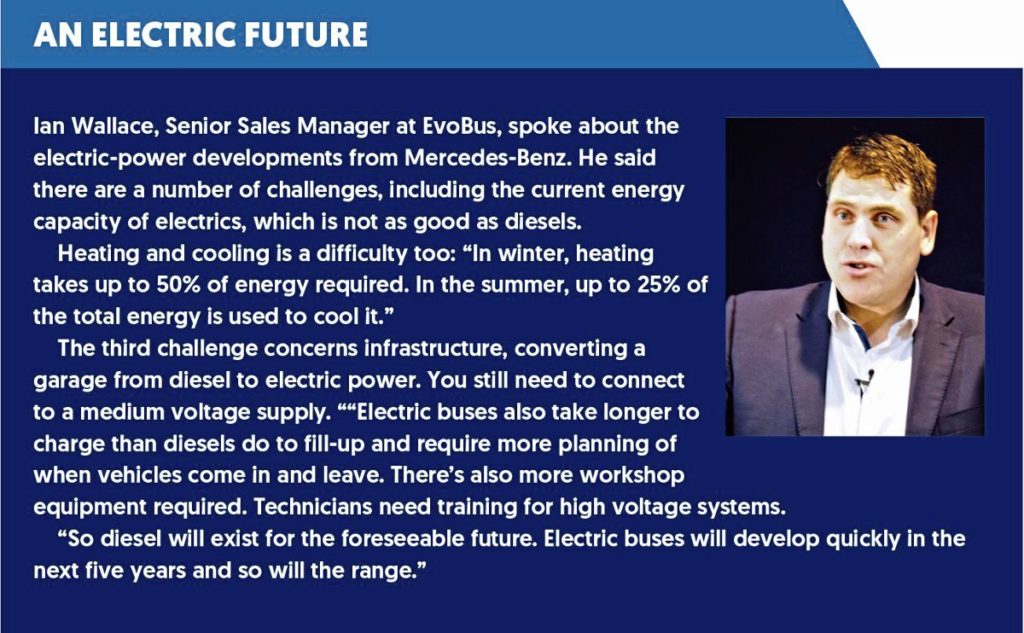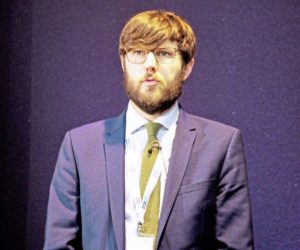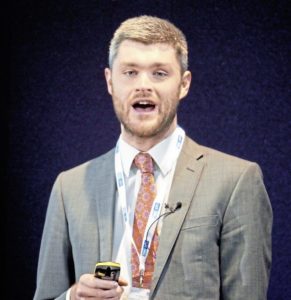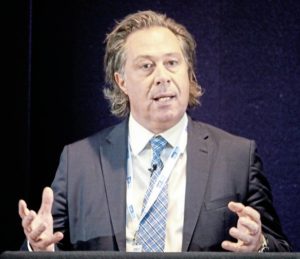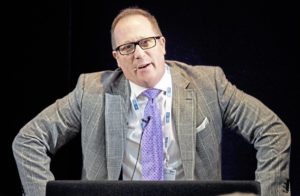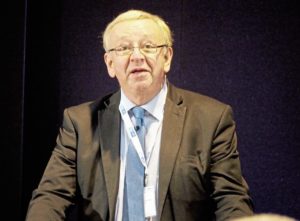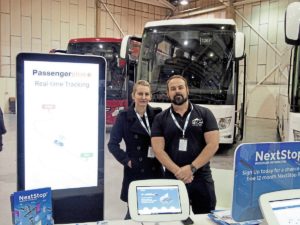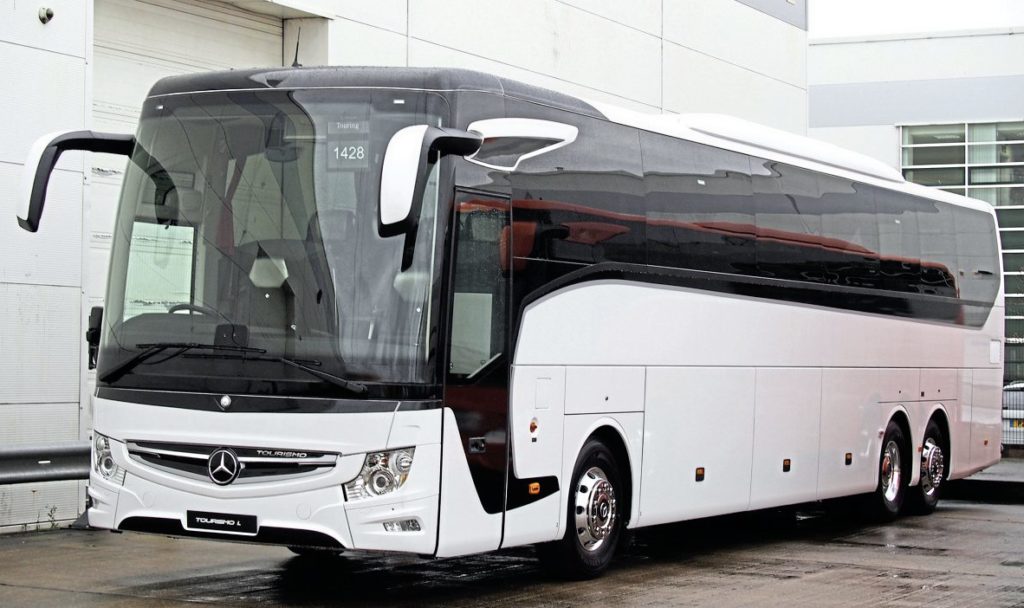Tomorrow’s world
Speakers gaze to the future in CPT’s annual Coaching Conference
Tomorrow’s World was the theme of this year’s CPT Coaching Conference. It saw a format shift compared to its previous incarnations, with this year’s event being a two-day affair. The first day included the CoachMarque Meeting, followed by the Coach Commission Meeting. After this, delegates had the chance to explore the One Stop Shop trade-stand area. The event was hosted by EvoBus across its two sites in Coventry.
Delegates staying overnight were treated to a meal and drinks at the Double Tree Hilton hotel nearby the EvoBus site.
Unsung heroes
After an opening speech by the typically chirpy, John Johnson, Chairman of CPT’s Coach Commission and Chairman of Johnsons Coach and Bus Travel, CPT’s President and MD of Bus Development at Go-Ahead Group, Martin Dean, took to the stage. Responding to friendly jibes the night before when he announced he was a bus operator, Martin reminded the gathered that Go-Ahead does operate coaches. “We run about 100 or so coaches, so I’m perfectly entitled to be here!” He quipped.
“Coaches are unsung heroes,” he said. “They have a very broad offering: day trips, longer coach trips, school runs, private hire and much more. All of us here know the benefit of coach travel. Because you go about your business quiet nd efficiently, it’s both a strength and a weakness. If you compare it to bus, bus is a more controversial sector. When buses privatised, the view was it was more a utility and maybe it should stay in the public sector.
As you can expect, politicians are interested in the bus sector. In coach, you just get on and do things on your own. You tend to get forgotten.”
Upgrading vehicles for air quality issues is something he touched on: “No doubt there is funding available for bus in a way not available for coaches. The reason? The sector is forgotten; it’s quiet and efficient. You need to get politicians interested, but not too interested.
“There are some local stakeholders and politicians who are starting to understand the key role you play going forward.”
Continuing the political topic, he mentioned Brexit. “CPT works hard to mention the issues you’ve got. Steven Salmon has been speaking to the House of Lords. If there is a no deal, then it’s absolutely important to getting the UK into the Interbus agreement as quickly as possible.”
Talking about the problems Brexit could pose: “On the bus side, it’s the availability of labour. But on coach, it’s access to the Continent.
“There are a lot of challenges, but the industry has got a great future. Nobody has admitted to a bad year and there have been lots of people saying they have had a good year. You’ve always managed to adapt to what is thrown at you. As a sector, you’re ready to deal with what’s coming at you.”
CASE for the future
Michael Thielman, CEO, EvoBus UK, spoke about “tomorrow’s vehicles”. He introduced the gathered to Mercedes-Benz’s CASE concept. CASE stands for Connected, Autonomous, Shared, Electric. “These are the four mega-trends we have to face.”
A lot of the developments in this area are being developed for Mercedes-Benz cars, but are expected to filter into coaches.
A video describing CASE said the ‘connected’ element emphasises that the vehicle has to be a hub, giving drivers the ability to communicate with it no matter where they are. There was a diagram showing the five levels of autonomous vehicles, the fifth level being completely autonomous. Currently, the industry is at level 2, where systems that help change lanes and brake are being used. Level four and five is the point at which drivers can take their hands off the wheel.
Shared services is another development Mercedes-Benz is preparing for. The video said peoples’ relationship with cars has gone unchanged for years. However, that is changing, with car ownership becoming fluid and adaptable. Mercedes’ owners, Daimler, invested in the car2go car-rental company in response to this change.
Mercedes is convinced the future is electric. Up to 21% of its cars will be electric by 2025, Mercedes claims.
“These things are currently happening,” said Michael. Going forward there will be more controversial discussion about autonomous vehicles, he claims. “Autonomous driving will take its time, but it is coming.” He gave the example of the autonomous ADL double-deckers due to enter service in Scotland in 2020 (see B&CB 1508, 30 November 2018).
Michael gave another example, involving autonomous Citaros on a busway in Amsterdam. “It was in a bus lane where traffic is more predictable, but it worked. It was braking for people who crossed the tracks.
“Urban operation is still quite unpredictable,” he continued, referring to difficulties with a less controlled town or city centre compared to a busway.
Mercedes-Benz is introducing Active Brake Assist 4, its latest incarnation of this technology, which is standard on all its touring coaches. “The system is not automated completely, but it’s one that helps the driver. If the driver does not react, it will come in and brake.”
The future for Mercedes-Benz in the PCV world is to feature more apps too, with its Omniplus On package. Michael said: “We need more apps and more support systems to help the driver.”
A new product is Uptime, a digital system which tells the operator when there might be a problem in the fleet, assisting maintenance. Designed to increase vehicle availability, it provides real-time information on the condition of vehicles. Michael said: “It tells when there might be a technical problem and communicates with the 24-hour service. It provides enough support to control, predict and prevent any vehicle problem.”
When asked when we can expect autonomous vehicles, Michael said: “It’s going to happen soon. The biggest problem is they need to be equipped with constant updates of what’s happening on the roads. How will automated cars work with actual drivers? I don’t think there will be a time in which drivers won’t be needed anytime soon.”
Need the infrastructure
In order to provide the infrastructure of the future, the National Infrastructure Commission conducted the National Infrastructure Assessment. Published in July 2018, it found that growth, in terms of population and employment, is happening faster in cities than anywhere lse in the country. Greg McClymont, Lead of Cities at the National Infrastructure Commission, said: “The bigger an area gets, the worse the congestion is.”
In the report, it provides some suggestions for government action to deal with the growing congestion. Greg said: “What it doesn’t try to do is suggest projects and schemes for each city. Even if we tried, we wouldn’t get that right. There is so much diversity in what is needed among the cities. But there are certain themes that are common to support growth. Obviously, non-car transport is one of them. Car is not sustainable.”
The organisation suggested the government puts in place the right structures and powers so city leaders can do what needs doing in their areas.
Greg added: “Innovation in road use has to be in place for autonomous vehicles. That’s for coaches and buses, as well as cars. How do we set up that infrastructure? Nobody knows the answer.
“What happens next? It’s over to the government. Next year we will find out whether they take on what we’ve proposed.”
Tomorrow’s cities
Introducing what the Low Carbon Vehicle Partnership does, the organisation’s Project Manager, Bus Working Group, Daniel Hayes, said: “We are a public private partnership. We get DfT and Transport Scotland funding to accelerate the shift to low carbon transport. The other half of the partnership comes from the industry. Anyone interested can get involved.
“The key aspect of how we work is we bring together interested people; we have five working groups. We will hopefully kickstart a coach one next year.” The aim of this project would be to create a government funding stream for low carbon coaches.
“We gather information on low carbon vehicles and do our own testing. We take all the knowledge we generate and put it into government policy. We were involved in writing the standards for Low Carbon Emission Buses (LCEB). We are in heavy talks with the government to reform that for the next generation of vehicles. We host a number of workshops. We have a number of guides too.”
Looking back to the past, he said: “The 20th Century was very much the age of the car. It enabled growth and opportunity and is cheap and convenient. We had to build a road network to support that. But we have realised that vision.”
He notes the Broadmarsh Centre in Nottingham is being redeveloped, but still as a car park. “Cars are still being encouraged into city centres. We need to talk to local authorities about this.”
Showing a picture of the well-appointed Wembley coach park, he said: “There are a few cases where people still think about coaches.”
The next slide showed an illustration of Volvo’s vision of Gothenburg in the future. Daniel noted it is interesting that there are no cars.
Potential game changers in the future transport mix are autonomous vehicles and drones.
Daniel said: “We are now looking at what we can do to make some transition on power in the future.”
Clean Air Zones (CAZs) is one concept. “If you set these congestion zones, then you must include private cars. Otherwise, people do not realise they are contributing to the problem.
“We see CAZs as the first step to shaping the future of our cities. The future can provide opportunities for mass transit. There is an opportunity for bus and coach.”
LowCVP has worked with the Energy Saving Trust to develop the Clean Vehicle Retrofit Accreditation Scheme (CVRAS) to approve aftermarket products to upgrade older coaches and buses to Euro VI, in line with CAZs and the ULEZ.
Daniel said: “The government has allocated £220m to help local industries adapt. I recommend you speak to your local authorities and ask: ‘Can you support us?’”
He notes Eminox has developed a retrofit product to upgrade older Volvo B9 based coaches to Euro VI, which has CVRAS accreditation.
He said: “I think CAZs are here to stay. I think they will become zero emission zones in the future.”
An app for that
Mathew Hassle, CEO of the conference’s headline sponsor, CoachHire.com, spoke on the emergence of transport apps. He explained his business really took off when it received a transformational £3.75m investment from Sir Brian Souter. He noted CoachHire.com is not the only one to have received investment in recent times. “There is a plethora of platforms in this sector. It’s the future of the industry.”
Mathew described CoachHire.com’s offering as Mobility as a Service (MaaS), an integration of various transport methods into a single mobility solution, accessible on demand. “All of the previous speakers have been talking to you about that in some form. There are various apps; for car clubs, ride sharing, on-demand transport. There are various solutions for various elements of the market. But it’s all about the future of the car. All of the apps have investors from cars. Toyota is the biggest investor in Uber.”
He notes MaaS has replaced 2.3bn private car journeys per year. “It’s moving very quickly. The global market value is $38.6bn. By 2025, it’s expected to be $358.35bn.”
Why are these apps proving so popular? “Is it about the price? No, it’s about value. People are looking for solutions, not services. You guys are great at providing a service, but we’re really good at providing solutions.
“I used to be in the taxi and chauffeur market. It is astonishing to see what happened there. In 2010, there were three huge black cab operators in London. Before 2018, they had been ‘Uber-ed’. Black cabs had been reduced by half because Uber has an amazing app. In 2007-08 I worked in black cabs and they had their heads in the sand. They didn’t see it coming.”
What are the benefits of being part of a solution like CoachHire.com? “You gain customers via global market access, customers you just wouldn’t get otherwise. These platforms will help you with that. Customers look for that solution and we provide that solution.”
If interested in using these online services, he gave the advice of: “Identify two to three partners if you’re interested in this. It doesn’t work with ten or 15. You have to have a clear strategy. Have contracts for service level agreement and ensure growth around these partnerships.”
Unintended consequences
“I’ll let you into a bit of a secret,” said Richard Turfitt, Senior Traffic Commissioner. “My colleagues laughed at me when I said I would be telling you all about tomorrow’s world. It seems to me that technology promises to make life easier, but it often throws up other challenges.”
He continued: “I wake up every morning terrified our system could go down. I didn’t worry about paper files. You could lock them up in a room.”
He assured the conference: “We employ hackers to test the systems. You will be pleased to know your details are safe with us.”
Richard did admit: “Applications were set to be reduced to seven weeks. Again, I’ll be very honest, we’re facing real challenges. Application times were slipping. We have been able to take steps to address that. Application times are creeping up again.
“I need to encourage you to help yourselves. Use the digital services and answer every prompt when you put your details in. We made the IT system so that you can go on and partially complete the application. The unintentional consequence of that is we are now having to deal with incomplete applications.
“We have made an enormous investment in the IT system. We have spent £23m on IT so far. We are using cloud-based systems for additional security.
“It’s difficult to talk about the future, but one thing that has become clear, that whatever our relationship is with Europe, there are already some savvy operators looking at different opportunities that might arise with our current partners in the EU. Operators might want to look at where the advantages are of investing in third party contraction investments.”
He notes some truck operators are looking at loading trailers and not the tractors on ferries for haulage out of the country. He ponders whether there will be some similar shift in coach operation. “I’ve got to make sure regulation doesn’t hold you back.”
On other alterations to rules and regulations: “There will be very slow change in the initial period in our changing relationship over the Channel. There will be little change to driver CPC.”
Moving on to another topic: “My brain hurts with autonomous vehicles. It will grow though, with very fast incremental changes and we are already seeing the challenges. If we put some kind of operator in an autonomous vehicle, how will we keep them awake?
“Where will culpability and responsibility lie? Then there’s arguments about who causes an accident. Is it an operator error, software error or infrastructure error? The Law Commission will go forward with it as long as the level of safety is at least as safe as a human driver. But how safe are drivers? Even if you do not operate an autonomous vehicle, you may be operating alongside people that are. We need to look at how it will affect business.”
Richard reminded delegates the Traffic Commissioners’ Office has updated guidance on how to maintain roadworthiness. It is available online, but this may be a case of unintended consequences here too. “Some operators are not acquainted with reading off screens.”
Emotions matter
Steven Salmon closed off the conference with a talk on how vehicle design affects passengers’ feelings about a service. He cited a study by Dr Mark van Hagen, which looked at passenger satisfaction on trains and at stations. “It’s about taking evidence from consumer psychology through to design.”
He presented a pyramid graph, with elements such as feeling safe, having a clean environment and convenience sitting at the base of the diagram; while punctuality lies further at the top. Steven said: “The important things are the bottom things. If you don’t get those right, there’s no point going on to the other parts of the pyramid.”
Another underpinning principle in this research is customer’s emotions. “Customers don’t spend all the time thinking about how they are experiencing it. It’s all about emotions. Why do they feel the way they do? We think in metaphors and images.
“If you see people having a good time on the coach, then you’ll have a good time. If you can see people with negative emotions, you will feel negative too.”
In a test on trains, van Hagen observed customer satisfaction surveys of people who had travelled on carriages with specially designed interiors. Some had internal art to make it look like a library, while others were decked out to look like a fairground or forest. There were significantly better satisfaction results from all of the passengers on these.
The same company screened some Olympic Games footage on the trains. A customer satisfaction survey found that this even helped boost people’s feelings on factors like punctuality and comfort. Steven said: “If you tart up the train, customers think everything is better. Colour, design, smell and sound matters.”
One Stop Shop
A section dedicated to trade was located in the EvoBus handover hall during the event.
Attending was Backhouse Jones, with its representatives handing out its latest Backchat marketing magazine and offering information on its services.
Promoting its services was Nationwide Coach Assistance, a pay-on-use emergency roadside assistance company. It provides assistance across the UK and Europe can provide a replacement coach with driver.
‘The Fuel Buyer’s Guide’ is a leaflet on purchasing fuel for commercial fleets being handed out by Portland Fuel. It was also providing information on AdBlue.
Helping spread the word to keep fleets legal by taxing and insuring them, the DVLA was there. Representatives from the organisation handed out information on its fleet scheme, which helps operators deal with the administrative burden of running a large number of vehicles.
Introducing the Aesys destination display equipment was Fogmaker.
Alfatronix displayed its integrated wireless charging devices. They are designed to be built in to tables or other surfaces and can feature the customer’s choice of branding.
Passenger information software and equipment is provided by Rise Digital Media. It promoted its NextStop audio visual (AV) screens, passenger wifi and passenger mobility app that enables real-time vehicle tracking, trip information and next stop announcements.
